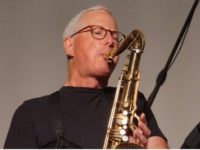Whenever I’ve listened to and written about a Rich Halley record — and there’s been a few — my ears will inevitably zero in on the drummer who seems to be the one shaping songs that are often either largely improvisations or completely so. A good reason for this simpatico is because his familiarity with the leader is familial. The drummer Carson Halley is, of course, the son of Rich Halley.
Carson has been the secret weapon in his dad’s various ensembles because of his contemporary sensibilities. He also possesses a paranormal feel for accurately following and/or guiding the semi-anarchy that happens whether the rest of the band is feelin’ randy or just wants to groove. Those things didn’t just happen, it’s come about from nearly 20 years of practicing with his father, inventing compositions on the spot, fully realized improvs that, in Carson’s words “had rhythmic, melodic and textural depth combined with forward motion.”
And that’s a pretty apt way to describe The Wild, Rich Halley’s new release, now out on Pine Eagle Records and a one-on-one with Carson finally documented for the public record.
These songs are mainly tonal, but they’re free in the real sense because there’s no head-solo-head pattern at play here, just a linear progression that demands the elder Halley to undertake the melodic and harmonic roles at once, making them flow logically and emotionally. Meanwhile, Carson fills in all the textural and timbral voids from his drum set. This is how that ‘forward motion’ is achieved.
Rich is, as always, a very instinctive improviser and Carson always accurately anticipates his changes. Listen, for instance, how Rich tests the limit of his sax near the middle of “Progenitor” as Carson eases up ever so subtly on the gas, giving his dad a little extra room to wail.
“Flat Plane In The Sky” demonstrates how to paint sax and drum colors on a barren landscape, the elder Halley playing the blues and the younger using his brushes to slide in an undercurrent of agitation.
The two also hold interest by shaping each song differently. The very next song (“The Stroll”) is groove-oriented, one that Carson is able to create fully from a snare drum, hi-hat and bass drum. All Rich has to do is float in the pocket. Rich switches to wood flute fronting a solemn marching beat on Native American-styled hymn “The Old Ways.”
But in all cases, it’s simply father and son feeding off the energy of each other and reveling in the moment, as on swinging “Cursorial,” or jumping together into the jazz abyss for the volatile “The Recon,” capped off by a drum solo that shows off a wide range of abilities at once.
Ornette had Denardo; Rich has Carson. In understanding the vital core of Rich Halley’s trios, quartets and quintets, The Wild is revelatory.
- James Brandon Lewis Quartet – ‘Abstraction Is Deliverance’ (2025) - May 27, 2025
- Soft Machine – ‘Drop’ (1971, 2025 remaster) - May 21, 2025
- Marshall Allen’s Ghost Horizons – ‘Live In Philadelphia’ (2025) - May 19, 2025



